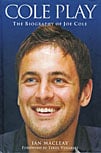 The Biography of Joe Cole
The Biography of Joe Cole
by Ian Macleay
John Blake, £17.99
Reviewed by Taylor Parkes
From WSC 245 July 2007
No, I couldn’t believe the title either. Another lavishly packaged quickie, Cole Play is predictably bland and impossibly turgid. It’s not that badly written – unlike most football-themed hack product, you would feel safe handing this in as English Language GCSE coursework – but it is so boring, so terribly uninspiring, like a book that’s played under José Mourinho for three years. There are no secrets here, no fresh perspectives, yet it runs to a whopping 310 pages, of which 309, at least, are entirely forgettable. Cole Play may not give short weight, but it’s topped up with a lot of ballast.
The fact is, it’s not even a biography of Joe Cole, much less the biography. Macleay, author of several books about Chelsea, has thrown together a bunch of match reports, touched up with specific reference to what Cole was doing that day, added an opening chapter on his early life (the period between birth and signing for Chelsea) and that’s pretty much it. I learnt next to nothing about the slack-mouthed wonderkid that I didn’t know already, just from reading newspapers and watching Match of the Day. More time is spent discussing Chelsea’s fortunes since the arrival of Roman Abramovich than anything Cole-specific; even then, it’s only the stuff that Gabby Logan could have told you.
Macleay is, of course, extraordinarily selective on the subject of Britain’s favourite oligarch – suggesting, for instance, that Roman “poured a substantial amount of money” into the remote Russian region of Chukotka “to improve the lot of the indigenous population”, as though this were the full story, and without bothering to mention where the money came from, how he attained governorship of the region, or the small matter of Chukotka being a tax haven for Sibneft. No one’s expecting investigative journalism in a book of this type, but modern football’s utter obsequiousness towards Abramovich is the perfect illustration of its absolute worship of money, no questions asked, and is never less than depressing. One passage at least produced a slight smirk: writing about Mourinho’s methods, Macleay muses “perhaps that is what appealed to Abramovich; not only did he want to win every game, but he also wanted to destroy the opposition”.
Unlike the spotless Mr Abramovich, I have a confession to make: I didn’t read the whole thing. All week, wading through it had been drying out my soul, and for such a lightweight read it’s incredibly exhausting – so I skipped a bit. It’s possible that for those 50 pages, Cole Play turned into a footballing version of Gravity’s Rainbow, becoming utter crap again at the point where I rejoined the action, but you know, I doubt it. The thing is, it seemed like the right thing to do – if a “biographer” can neglect his professional duty like this, it’s only fair that the reviewer should meet him halfway.
Besides, reading this kind of rushed-out hackwork usually feels like a splash of ordure landing on your face – it’s unpleasant, but you can brush it off. Thanks to its sheer volume, Cole Play is more like drowning in a slurry pit. There have been many worse books about football, but few make eating your own legs seem such an appealing proposition.